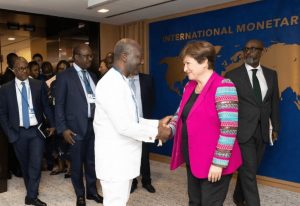Ghana, IMF begin 17th support journey with $3bn loan approval
May 21, 2023837 views0 comments
By Isaac AIDOO, in Accra, Ghana
Ghana has sealed yet another deal with the lender of last resort as the International Monetary Fund’s (IMF) executive board has approved a $3 billion, three-year extended credit facility for Ghana to support its economic recovery.
The loan is to support the government’s Enhanced Domestic Programme, which is to help the country navigate through the current economic hardship and improve its fiscal balances sustainably.
This is the 17th time the West African country has received IMF support. In early 2015, Ghana turned to the IMF for a $918 million loan to help stabilise the economy. IMF advisors, working with the Ghanaian government, developed a three-part programme – Restore debt sustainability, government limited hiring and wage increases in the public sector and eliminated subsidies for utilities and petroleum products.

$3bn deal not a magic wand – Minister
Ken Ofori-Atta, the country’s finance minister, has acknowledged that the IMF board approval for the $3 billion is far from a magic solution to current economic difficulties since implementation of over 50 structural and policy reforms has just begun.
He however described the deal as a crucial step in the necessary journey of strong reforms, inclusive growth, relentless pursuit of a growth agenda geared towards restoring the economy to a place of strength, prosperity and resilience.
Boost for declining foreign-exchange reserves
The latest $3 billion approved funding will serve to replenish Ghana’s foreign-exchange reserves, which have seen a significant decline from $9.7 billion in December 2021 to $2.6 billion in April 2023.
Ghana’s official sector creditors formed a committee co-chaired by China and France and agreed to debt restructuring talks, the Paris Club said, which paved the way for a sign-off on the IMF loan, which was agreed at staff level in December.
Ghana is negotiating its international debt rework under the Group of 20’s Common Framework platform and completed a domestic debt exchange earlier this year.
According to the government, about $600 million would be disbursed to Ghana within a week, once Ghana’s programme is approved by the Executive Board of the IMF.
The second tranche of disbursement would be expected by December 2023.
This is however subject to meeting some conditions under the programme.
The remaining amount will be disbursed in tranches of $360 million every six months, subject to meeting the IMF programme conditions.
$54bn total public debt stock
Ghana’s total public debt stock stands at $54 billion, out of which $28 billion is owed to foreign creditors.
$1.9bn owed China
Out of Ghana’s $8.5 billion bilateral loans, about $1.9 billion is owed to China.
Factors sinking economies
Ballooning inflation, escalating borrowing costs and a strong dollar have made repaying loans and raising money significantly more expensive for dozens of developing nations, pushing several into default.
Other measures to complete the bailout
Government has already completed tariff adjustment by the Public Utilities Regulatory Commission (PURC), Publication of the Auditor-General’s Report on COVID-19 spending, as well as onboarding of Ghana Education Trust Fund (GETFund), District Assemblies Common Fund (DACF) and Road Fund on the Ghana integrated financial management information system (GIFMIS).
Preserve stability of financial sector – IMF
The IMF has been stressing the importance of preserving the soundness and stability of Ghana’s financial sector, saying the financial sector’s stability will be a major determinant of the success or otherwise of the Fund’s latest programme with Ghana.
The Fund in a statement issued after the approval of the $3 billion bailout package, maintained that given the adverse impact of the domestic debt restructuring on balance sheets of financial institutions, “the authorities will devise and implement a comprehensive strategy to rapidly rebuild financial institutions’ buffers and exit from temporary regulatory forbearance measures.”
Zero budget financing by BoG
Under the Staff Level Agreement with the IMF, Bank of Ghana (BoG) and the Ministry of Finance have finalised a Memorandum of Understanding (MoU) on zero budget financing which will be signed soon.
Parliament passed the outstanding revenue bills concluding the required prior actions agreed in the Staff-Level agreement.
The Bills
The Bills, which were passed under a certificate of urgency during a marathon all-night session of the House, include the Excise Duty (Amendment) Bill, 2022 and Income Tax (Amendment) (No. 2) Bill, 2022.
The others are Growth and Sustainability Bill, 2022 and the Ghana Revenue Authority (Amendment) Bill, 2022.
GH₵4bn revenue targeted each year
Cumulatively, the bills are expected to rake in GH₵4 billion annually. However, this target will be missed this year as the bills are yet to be passed while the first quarter ends soon.
